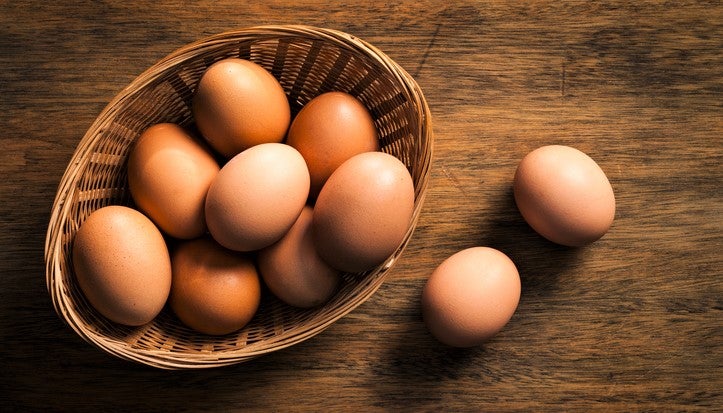What are the Healthiest Eggs to Eat?
As is the case with many foods, you’ll find that some organic products come in a wide variety of different colors. Tomatoes can be enjoyed in every hue from green, to yellow, to orange – as well as varying in size from grape-sized cherry tomatoes to beef tomatoes as big as your as hand – and you can get onions in a range of shades from green to white, and from red to purple. Another food to be enjoyed in a multitude of colors is the egg, a protein-loaded and vitamin-laded superfood that you can cook in more ways than one. No matter if you’re frying, poaching, boiling, or baking them – or even using them to make egg fried rice – eggs come in a multitude of different colors.
Whether their yolks are yellow, or feature a darker and more vitamin-rich amber yolk, they can be found in shells ranging from pure white to light brown with dark speckles. The cause of this coloration is not, as the myth goes, because eggs are bleached white before going on sale in supermarkets – although it is true that the outside of eggs are thoroughly cleaned before being boxed in cartons and stacked on shelves. No, the cause of an egg’s exterior color is based on the breed of hen that laid it.
With so many different shades to choose from, you might be wondering whether there any particular health benefits attributed to the color of the shell, so let’s crack into this one and see what we find.
Are brown eggs healthier than white?

The short answer to that question is no. Even though some studies show that brown eggs contain more omega-3 fatty acids, the additional trace amounts found in one over the other are virtually negligible. There is the assumption that brown eggs, on account of their typically higher price, contain some added health benefits, but it is difficult to really justify that with facts. As such, when it comes to picking a healthier kind of egg based on the color of its shell, there won’t be any recognizable difference in choosing white over brown – the health benefits of eating protein-rich eggs is consistent no matter what color shell you pay for.
The higher premium demanded by brown eggs in grocery stores or farmer’s markets is not because customers will necessarily be paying extra for the ‘more natural’ qualities of brown eggs, but rather because the red-feathered hens that lay these kinds of eggs are usually larger than the lighter-colored hens that lay white eggs. As such, the former need more chicken feed than the latter, and so it’s the additional cost of keeping them happy and healthy which results in the price increase. This is why you will see more white eggs in your local supermarket, as it is more cost-effective to rear the smaller hens that produce them.
Big birds with big appetites laying brown eggs will be squeezing a few more pennies out of your shopping bill, but it’s always worth paying a little extra for farm-reared organic produce. Such is the rise of environmentally conscious consumers, you will likely see a rise in the sale of free-range or pasture-raised eggs, and many restaurants proudly present small sidenotes on their menus that let you know where their eggs have come from. Taking its lead from other major food trends, such as the increasing presence of plant-based meats in everything from the most humble independent eateries to the biggest quick-service restaurants, organic eggs are likely to find their way onto your plate in the near future.
Which hens produce which color eggs?

Determining which hens will lay what eggs is informed by the color of the hen’s earlobes, as well as the color of its feathers. Generally speaking, white-feathered hens with white earlobes will give you an egg of the same color – white, of course – while brown eggs will be the product of hens with red earlobes and light brown, earth-colored plumage. This is a sweeping overview and it must be said that there are exceptions to this rule, for you can even find eggs with different colors laid by the same hen on the same day. It is the egg’s bloom – the last part of the shell to set before the egg is laid, a kind of foamy protein layer which protects the egg – which contains a substantial amount of pigment and can affect the overall hue of the shell.
The breed of hens which most consistently lay brown eggs are Lohmann Browns, Highline Browns, and Bovan Browns, and these are favored by farmers for the added bonus of their mellow, non-violent personalities, meaning they are unlikely to attack one another. The beginning of a hen’s 12-month laying cycle, beginning at 18-22 weeks, will also produce a lighter shade than the eggshells produced at the end of that cycle. Interestingly, some farmers have found that a wide array of colors can be achieved by crossbreeding different hens, producing eggs with shells as diverse as dark green and speckled pink.
When it comes to rearing hens, the industry standard gives hens just two square feet of roaming space, so even those cartons with “pasture-raised” printed on them may not be giving you a dozen eggs laid by hens with complete rule of the roost. If you want peace of mind in knowing that you eggs are sourced from the happiest, healthiest hens you could wish for, with 25 times the typical pasture space to forage around in, then you can’t do any better than the 180-egg crates currently on sale from Buffalo Market.
Laid by hens with an enormous 50 acres of open grassland to explore, our free-range and pasture-raised eggs are sourced from small-scale, independent farmers across California. Thanks to the strong relationships we nurture with these local producers, Buffalo Market is able to offer you a market-quality product for less than half the price of competitively priced wholesale eggs. Averaging a cost of less than $2 per dozen, these eggs are from hens who have never set foot in a cage and promise to be as creamy and delicious as they are ethically sourced. Why not try some today and see how you can taste the difference in buying organic.


